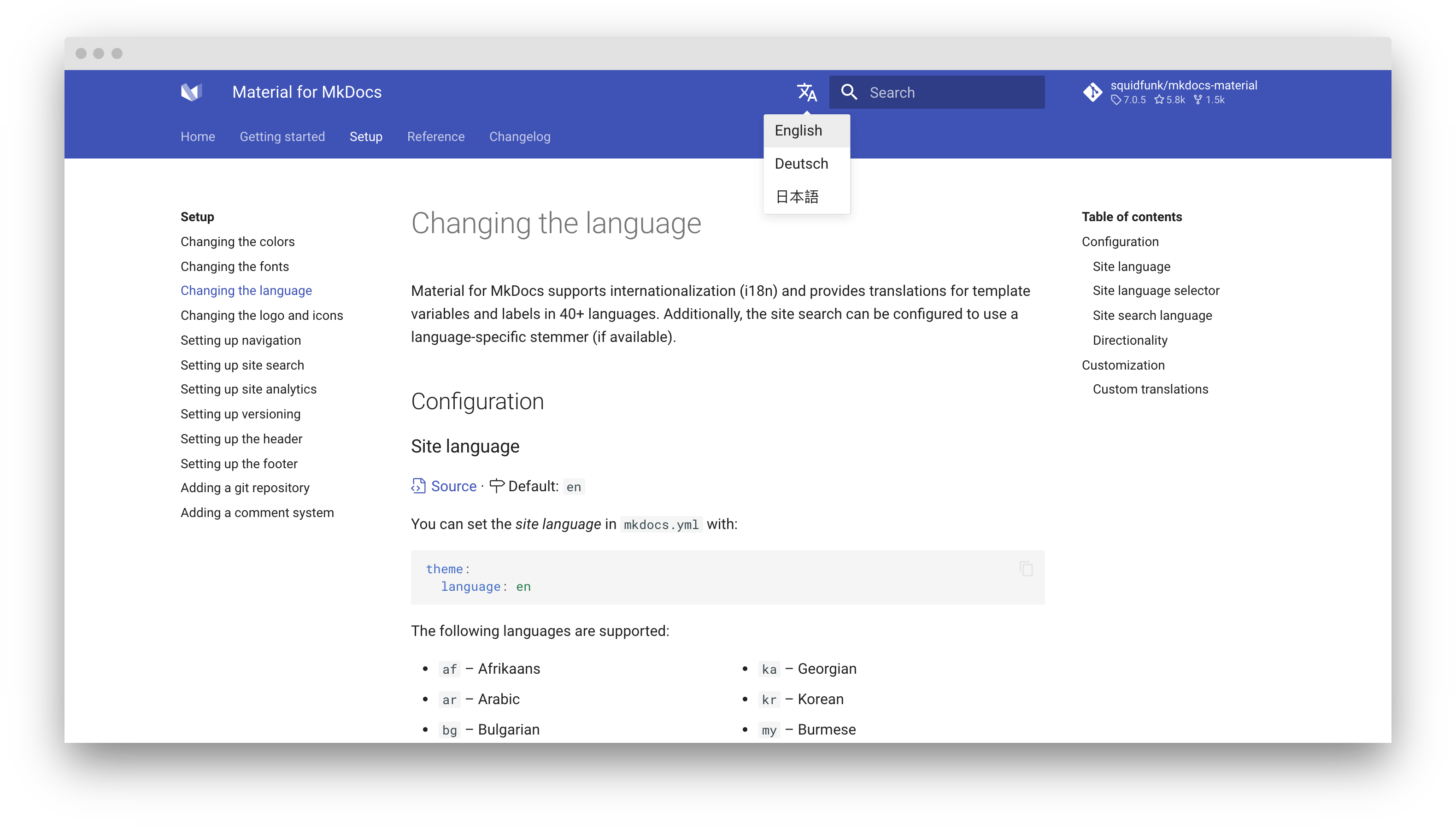5.2 KiB
| template |
|---|
| overrides/main.html |
Changing the language
Material for MkDocs supports internationalization (i18n) and provides translations for template variables and labels in 40+ languages. Additionally, the site search can be configured to use a language-specific stemmer (if available).
Configuration
Site language
:octicons-file-code-24: Source · :octicons-milestone-24: Default: en
You can set the site language in mkdocs.yml with:
theme:
language: en
The following languages are supported:
af– Afrikaansar– Arabicbg– Bulgarianbn– Bengali (Bangla)ca– Catalancs– Czechda– Danishde– Germanen– Englisheo– Esperantoes– Spanishet– Estonianfa– Persian (Farsi)fi– Finnishfr– Frenchgl– Galiciangr– Greekhe– Hebrewhi– Hindihr– Croatianhu– Hungarianid– Indonesianis– Icelandicit– Italianja– Japaneseka– Georgiankr– Koreanmn– Mongolianmy– Burmesenl– Dutchnn– Norwegian (Nynorsk)no– Norwegianpl– Polishpt– Portuguesero– Romanianru– Russiansh– Serbo-Croatiansi– Sinhalesesk– Slovaksl– Sloveniansr– Serbiansv– Swedishth– Thaitr– Turkishuk– Ukrainianvi– Vietnamesezh– Chinese (Simplified)zh-Hant– Chinese (Traditional)zh-TW– Chinese (Taiwanese)- Add language
Note that some languages will produce unreadable anchor links, due to the way the default slug function works. Consider using a Unicode-aware slug function, as documented here.
Site language selector
:octicons-file-code-24: Source · :octicons-beaker-24: Experimental
If your documentation is available in multiple languages, a language selector
can be added to the header next to the search bar. Alternate languages can be
defined via mkdocs.yml:
extra:
alternate:
# Switch to English
- name: English
link: <your-site>/en/
lang: en
# Switch to German
- name: Deutsch
link: <your-site>/de/
lang: de
# Switch to Japanese
- name: 日本語
link: <your-site>/ja/
lang: ja
This will render a language selector in the header next to the search bar:
Site search language
:octicons-file-code-24: Source · :octicons-milestone-24: Default: automatically set
Some languages, like Arabic or Japanese, need dedicated stemmers for search to work properly. Material for MkDocs relies on lunr-languages to provide this functionality. See the guide detailing how to set up site search for more information.
Directionality
:octicons-file-code-24: Source · :octicons-milestone-24: Default: automatically set
While many languages are read ltr (left-to-right), Material for MkDocs also
supports rtl (right-to-left) directionality which is inferred from the
selected language, but can also be set with:
theme:
direction: ltr
Click on a tile to change the directionality:
ltr
rtl
Customization
Custom translations
:octicons-file-code-24: Source · :octicons-mortar-board-24: Difficulty: easy
If you want to customize some of the translations for a language, just follow
the guide on theme extension and create a new partial in
partials/languages, e.g. en-custom.html. Next, look up the translation you
want to change in the base translation and add it to the partial.
Let's say you want to change "Table of contents" to "On this page":
<!-- Use en language as fallback -->
{% import "partials/languages/en.html" as fallback %}
{% macro override(key) %}{{ {
"toc.title": "On this page"
}[key] }}{% endmacro %}
<!-- Re-export the translation macro for mkbuild-material to use -->
{% macro t(key) %}{{ override(key) or fallback.t(key) }}{% endmacro %}
Then, add the following lines to mkdocs.yml:
theme:
language: en-custom
